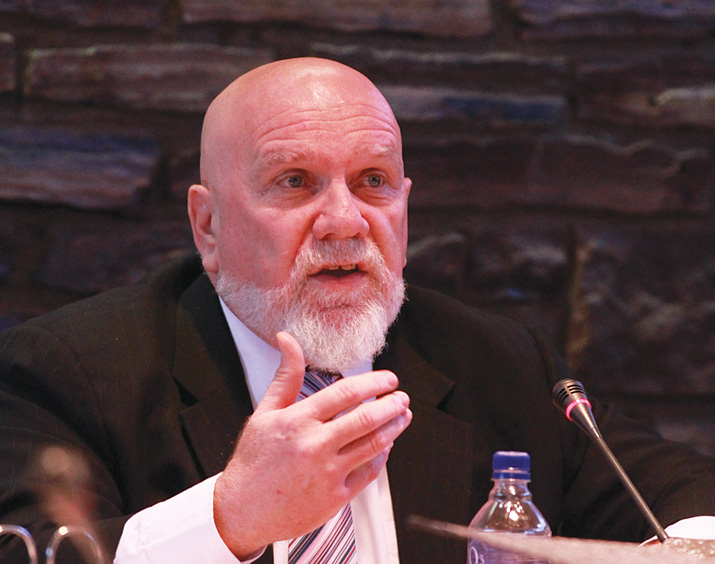South African Ambassador to Botswana Mdu Lembede found himself backed against the wall as he parried scathing allegations against South Africa at a presentation organised by BRICS countries in Gaborone last week. Ambassador Lembede came to South Africa’s defence when two delegates from Botswana, Professor Roman Grynberg and Deputy Speaker Pono Moatlhodi reminded South African representatives that they catalysed the collapse of the Mmamabula power project by refusing to give guarantees that South Africa would purchase power from the project.
Ambassador Lembede and his deputy, Minister-Counsellor Mthembisi Mjkikeliso, led a delegation of Ambassadors from the BRICS group of countries as they made a presentation to the media and other stakeholders in Gaborone last week. At the briefing, Anil Sooklal, BRICS Sous-Sherpa, announced the formation of the New Development Bank (NDB) to lead the bloc’s Africa engagement and finance infrastructure development projects in Africa. Sooklal said BRICS countries have resolved to forge stronger economic ties with Africa and avail much needed financing, at much cheaper rates, for infrastructure development projects in the continent. An initial capital layout of US$50billion would come from member states’ contributions.
Professor Grynberg asked what BRICS was bringing to the table that was different from what has been offered by developed countries.
“The reality is that you all want the same thing. You all want our raw materials for your development,” said Professor Roman Grynberg, Senior Research Fellow at BIDPA.
He said the 2.7 billion tonne Mmambula project was heavily dependent on guarantees that Eskom would purchase Mmamabula’s power under an IPP agreement, but South Africa later reneged on its promise, leading to the project failing. The project was expected to help Botswana attain energy independence and boost diversification away from diamonds. South Africa’s u-turn sparked allegations that Eskom was protecting its monopoly on thermal power generation.
Professor Grynberg also questioned South Africa’s loyalty and commitment to Africa’s growth and asked if the BRICS voyage into Africa was not in fact geared at boosting South Africa’s dominance. He asked why South Africa would refuse to purchase power from Botswana, and later sign an agreement through which it will import raw coal from Botswana.
Pundits have argued that the coal export agreement flies in the face of beneficiation, as a better agreement would have been one in which Eskom purchased electricity from Botswana.
“It doesn’t make sense for Botswana to export raw materials, in this case low cost, low quality coal to South Africa instead of generating the power on site. What’s worse, we will later import power, generated from our raw materials, from South Africa,” they said.
While he concurred that BRICS countries are looking for African raw materials, Ambassador Sooklal said they will always strive for beneficiation. He said it is important to explore Africa’s raw materials, its youthful labour force and industry potential for the benefit of the African people. For his part, Ambassador Lembede refuted claims that South Africa refused to purchase power from Botswana, saying South Africa has never intentionally inconvenienced Botswana.
“Botswana is a sovereign state and is free to enter into any commercial agreement, including with South Africa, without interference. We respect that sovereignty,” he said.
Botswana’s Deputy Speaker, Pono Moatlhodi asked if the current power crisis would not have been avoided if South Africa had agreed to purchase power from Mmamabula. Once again Ambassador Lembede said South Africa is working with other states to address the power problem in the region. He added that South Africa continues to supply power to Botswana through its 100 MW and 200 Mw non form power supply agreements.

